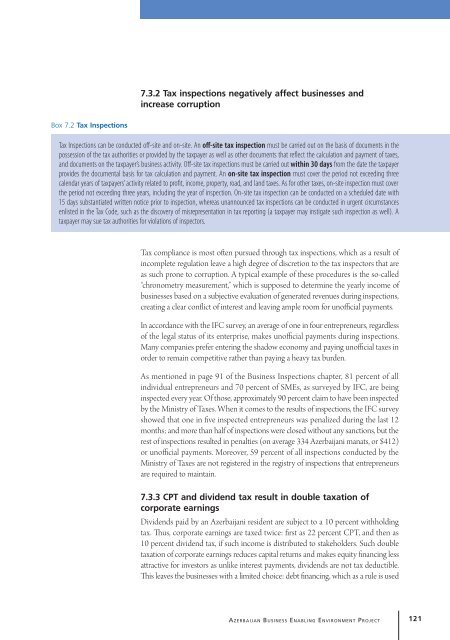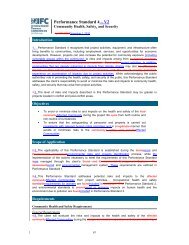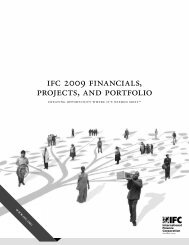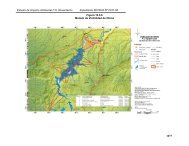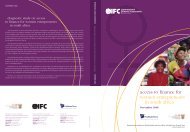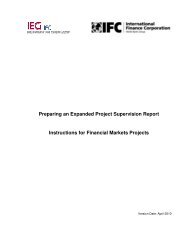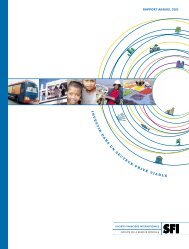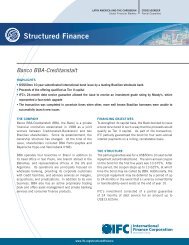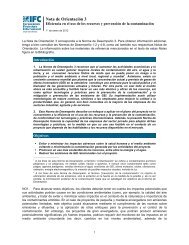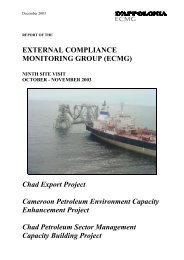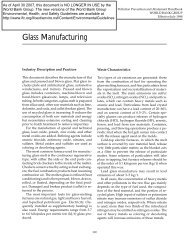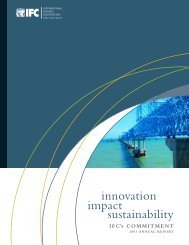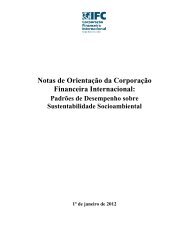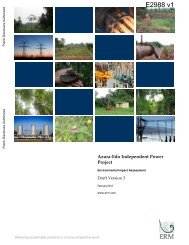Study of Small and Medium Enterprises in Azerbaijan - IFC
Study of Small and Medium Enterprises in Azerbaijan - IFC
Study of Small and Medium Enterprises in Azerbaijan - IFC
You also want an ePaper? Increase the reach of your titles
YUMPU automatically turns print PDFs into web optimized ePapers that Google loves.
7.3.2 Tax <strong>in</strong>spections negatively affect bus<strong>in</strong>esses <strong>and</strong><br />
<strong>in</strong>crease corruption<br />
Box 7.2 Tax Inspections<br />
Tax Inspections can be conducted <strong>of</strong>f-site <strong>and</strong> on-site. An <strong>of</strong>f-site tax <strong>in</strong>spection must be carried out on the basis <strong>of</strong> documents <strong>in</strong> the<br />
possession <strong>of</strong> the tax authorities or provided by the taxpayer as well as other documents that reflect the calculation <strong>and</strong> payment <strong>of</strong> taxes,<br />
<strong>and</strong> documents on the taxpayer’s bus<strong>in</strong>ess activity. Off-site tax <strong>in</strong>spections must be carried out with<strong>in</strong> 30 days from the date the taxpayer<br />
provides the documental basis for tax calculation <strong>and</strong> payment. An on-site tax <strong>in</strong>spection must cover the period not exceed<strong>in</strong>g three<br />
calendar years <strong>of</strong> taxpayers’ activity related to pr<strong>of</strong>it, <strong>in</strong>come, property, road, <strong>and</strong> l<strong>and</strong> taxes. As for other taxes, on-site <strong>in</strong>spection must cover<br />
the period not exceed<strong>in</strong>g three years, <strong>in</strong>clud<strong>in</strong>g the year <strong>of</strong> <strong>in</strong>spection. On-site tax <strong>in</strong>spection can be conducted on a scheduled date with<br />
15 days substantiated written notice prior to <strong>in</strong>spection, whereas unannounced tax <strong>in</strong>spections can be conducted <strong>in</strong> urgent circumstances<br />
enlisted <strong>in</strong> the Tax Code, such as the discovery <strong>of</strong> misrepresentation <strong>in</strong> tax report<strong>in</strong>g (a taxpayer may <strong>in</strong>stigate such <strong>in</strong>spection as well). A<br />
taxpayer may sue tax authorities for violations <strong>of</strong> <strong>in</strong>spectors.<br />
Tax compliance is most <strong>of</strong>ten pursued through tax <strong>in</strong>spections, which as a result <strong>of</strong><br />
<strong>in</strong>complete regulation leave a high degree <strong>of</strong> discretion to the tax <strong>in</strong>spectors that are<br />
as such prone to corruption. A typical example <strong>of</strong> these procedures is the so-called<br />
“chronometry measurement,” which is supposed to determ<strong>in</strong>e the yearly <strong>in</strong>come <strong>of</strong><br />
bus<strong>in</strong>esses based on a subjective evaluation <strong>of</strong> generated revenues dur<strong>in</strong>g <strong>in</strong>spections,<br />
creat<strong>in</strong>g a clear conflict <strong>of</strong> <strong>in</strong>terest <strong>and</strong> leav<strong>in</strong>g ample room for un<strong>of</strong>ficial payments.<br />
In accordance with the <strong>IFC</strong> survey, an average <strong>of</strong> one <strong>in</strong> four entrepreneurs, regardless<br />
<strong>of</strong> the legal status <strong>of</strong> its enterprise, makes un<strong>of</strong>ficial payments dur<strong>in</strong>g <strong>in</strong>spections.<br />
Many companies prefer enter<strong>in</strong>g the shadow economy <strong>and</strong> pay<strong>in</strong>g un<strong>of</strong>ficial taxes <strong>in</strong><br />
order to rema<strong>in</strong> competitive rather than pay<strong>in</strong>g a heavy tax burden.<br />
As mentioned <strong>in</strong> page 91 <strong>of</strong> the Bus<strong>in</strong>ess Inspections chapter, 81 percent <strong>of</strong> all<br />
<strong>in</strong>dividual entrepreneurs <strong>and</strong> 70 percent <strong>of</strong> SMEs, as surveyed by <strong>IFC</strong>, are be<strong>in</strong>g<br />
<strong>in</strong>spected every year. Of those, approximately 90 percent claim to have been <strong>in</strong>spected<br />
by the M<strong>in</strong>istry <strong>of</strong> Taxes. When it comes to the results <strong>of</strong> <strong>in</strong>spections, the <strong>IFC</strong> survey<br />
showed that one <strong>in</strong> five <strong>in</strong>spected entrepreneurs was penalized dur<strong>in</strong>g the last 12<br />
months; <strong>and</strong> more than half <strong>of</strong> <strong>in</strong>spections were closed without any sanctions, but the<br />
rest <strong>of</strong> <strong>in</strong>spections resulted <strong>in</strong> penalties (on average 334 <strong>Azerbaijan</strong>i manats, or $412)<br />
or un<strong>of</strong>ficial payments. Moreover, 59 percent <strong>of</strong> all <strong>in</strong>spections conducted by the<br />
M<strong>in</strong>istry <strong>of</strong> Taxes are not registered <strong>in</strong> the registry <strong>of</strong> <strong>in</strong>spections that entrepreneurs<br />
are required to ma<strong>in</strong>ta<strong>in</strong>.<br />
7.3.3 CPT <strong>and</strong> dividend tax result <strong>in</strong> double taxation <strong>of</strong><br />
corporate earn<strong>in</strong>gs<br />
Dividends paid by an <strong>Azerbaijan</strong>i resident are subject to a 10 percent withhold<strong>in</strong>g<br />
tax. Thus, corporate earn<strong>in</strong>gs are taxed twice: first as 22 percent CPT, <strong>and</strong> then as<br />
10 percent dividend tax, if such <strong>in</strong>come is distributed to stakeholders. Such double<br />
taxation <strong>of</strong> corporate earn<strong>in</strong>gs reduces capital returns <strong>and</strong> makes equity f<strong>in</strong>anc<strong>in</strong>g less<br />
attractive for <strong>in</strong>vestors as unlike <strong>in</strong>terest payments, dividends are not tax deductible.<br />
This leaves the bus<strong>in</strong>esses with a limited choice: debt f<strong>in</strong>anc<strong>in</strong>g, which as a rule is used<br />
Aze r b a i j a n Bu s i n e s s En a b l i n g En v i r o n m e n t Pr o j e c t 121


